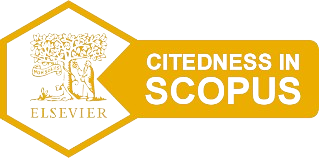The Effect of Goal Setting, Self Efficacy, Interest and Peer Support on Self Regulated Learning
DOI:
https://doi.org/10.15408/tjems.v7i1.13760Keywords:
belajar regulasi diri, penentuan tujuan, efikasi diri, minat dan dukungan teman sebaya, Self-regulated learning, goal setting, self-efficacy, interest, peer supportAbstract
Abstract
This research aims to see whether goal setting, self-efficacy, interest and peer support altogether have impact on self-regulated learning of students of STSN. Research population is 328 students of first to fourth year of STSN, while the sample is 291 students which filtered using convenience sampling method. This is a quantitative research. Research validity is examined using Confirmatory Factor Analysis (CFA). Data is analysed using multiple regression analysis. The result shows that goal setting, self-efficacy, interest and peer support altogether have impact on self-regulated learning. Variables of intensity, course efficacy, and intrinsic orientation have significant impact on self-regulated learning. While variables of content, roommate efficacy, social efficacy, affected related valence, value related valence, intrinsic orientation, tangible, belonging, appraisal, and self-esteem are statistically not proven to have an impact on self-regulated learning. In particular, this research shows that peer support independently has no effect on self-regulated learning meanwhile previous research has shown the opposite. Further research needs to consider the utilization of operational language which culturally appropriate regarding questionnaire drafting. It is because the questionnaire with the basis of local culture will ignite appropriate response from the respondents.
Abstrak
Penelitian ini bertujuan untuk melihat apakah penentuan tujuan, efikasi diri, minat dan dukungan teman sebaya berpengaruh bersama-sama terhadap regulasi diri mahasiswa Sekolah Tinggi Sandi Negara. Populasi penelitian adalah 328 mahasiswa STSN sedangkan sampel berjumlah 291 mahasiswa dengan menggunakan tehnik sampling convenience. Validitas alat ukur dianalisis dengan menggunakan CFA sedangkan data riset dianaisis dengan tehnik regresi berganda. Hasil penelitian menunjukkan bahwa penentuan tujuan, efikasi diri, minat dan dukungan teman sebaya secara bersama-sama berpengaruh terhadap regulasi diri mahasiswa. Secara khusus riset ini menunjukkan bahwa dukungan teman sebaya tidak berpengaruh terhadap regulasi diri mahasiswa, artinya, riset ini berbeda dengan hasil riset terdahulu yang menunjukkan bahwa dukungan teman sebaya berpengaruh terhadap regulasi diri. Penelitian lebih lanjut perlu mempertimbangkan penggunaan bahasa operasional yang sesuai dengan budaya terkait penyusunan kuesioner. Pasalnya, kuesioner yang berbasis budaya lokal akan memicu respon yang tepat dari responden.
How to Cite: Sanyoto, B., Saloom, G. (2020). The Effect of Goal Setting, Self Efficacy, Interest and Peer Support on Self Regulated Learning. TARBIYA: Journal of Education in Muslim Society, 7 (1), 88-101. doi:10.15408/tjems.v7i1.13760.
References
Ainley, (1987). The factor structure of curiosity measures:breadth and depth of interest curiosity styles. Australian journal of psychology 39(1); 53-59.
Allgood, W.P, Risko, V.J, Álvarez, M.C, & Fairb. (2000). Factors that influence study. In R.F. Flippo , & D.C. Caverly , Handbook of college reading and study strategy research (pp. 201-219). New York: NJ: LEA.
Alport, G. W. (1961). Pattern and growth in personality. New York: Holt.
Balapumi, Aitken, & Ashley. (2012). Concepts and factors influencing independent learning in is higher education. Proceedings of the 23rd Australasian Conference on Information Systems (ACIS) (pp. 1-10). Geelong, Victoria: Deakin University.
Bandura, A. (1986). Social foundations of thought and action: A social cognitive theory. Neywork: Englewood Cliffs, NJ: Prentice-Hall.
Bandura, A. (1997). Self-efficacy: The exercise of control. New York: Freeman.
Bandura. (1994). “Self-efficacy”, In V. S. Ramachaudran (Ed.), In Bandura, Encyclopedia of human behavior (Vol. 4, pp. 71-81). New York: Academic Press.
Behaghely. (2015). Ready for boarding? the effects of boarding school for disadvantaged students. American Economic Journal: Applied Economics, 9(1), 140–164.
Bembenuty, H. (2011). Introduction: Self-regulation of learning in postsecondary education. New directions for teaching and learning. Journal online Willey, 126, 3-8.
Berlyne, D. E. (1960). McGraw-Hill series in psychology. Conflict, arousal, and curiosity. New York, NY, US: McGraw-Hill Book Company.
BR Lee & Barth. (2009). Residential education: An emerging resource for improving educational outcomes for youth in foster care? Children & Youth Services Review, 31, 155-160.
Cohen, S. (2004). Social Relationships and Health. American Psychologist, 59(8), 676-684.
Cohen, S., & Hoberman, H. (1983). Positive events and social supports as buffers of life change stress. Journal of Applied Social Psychology, 13, 99-125
Cookson, P. W. (2009). Perspectives on elite boarding schools. In M. Berends, M. G. Springer, D. Ballou, & H. J. Walb, Handbook of research on school choice (pp. 461-478). New York: Oxon: Routledge.
Cree, A. C. (2000). Lights out and be quiet! A sociological research in Australian boarding education (2nd ed.). Parkville, Australia: Australian Combined University Press.
Csikszentmihalyi, M. (1975). Beyond Boredom and Anxiety. Washington: Jossey-Bass Publishers.
Csikszentmihalyi, M., Rathunde, K., & Whalen, S. (1993). Talented teenagers. New York, NY: Cambridge University Press.
Deci, E.L. (1992). The relation of interest to the motivation of behavior: a self-determination theory perspective. In K.A. Renninger, S. Hidi & A. Krapp (Eds.), The role of interest in learning and development. Hillsdale, NJ: Erlbaum, pp. 43–71.
Dennis, (2003) Peer support; Concept analysis; Theory development; Nursing science. International Journal of Nursing Studies 40 (2003) 321–332.
Dewey, J. (1913). Interest and effort in education. Boston: Riverside Press.
Durik, A. M., & Harackiewicz, J. M. (2007). Different strokes for different folks: How individual interest moderates the effects of situational factors on task interest. Journal of Educational Psychology, 99(3), 597-610.
Fenollar, Roman & Cuestas, (2007). University students' academic performance: an integrative conceptual framework and empirical analysis. British Journal of Educational Psychology 77 (4):873-891.
Hidi, S. (2006). Interest: A unique motivational variable. Educational Research Review, 1, 69–82.
Hidi, S., & Renninger, K. A. (2006). The four-phase model of interest development. Educational Psychologist, 41, 111–127.
Krapp, Renninger & Hoffman, (1998). Interest, learning, and the psychological processes that mediate their relationship. Journal of educational psychology, 94(3).545-561
Lee, T. W., Locke, E. A. & Latham, G. P. (1989). Goal setting theory and job performance. In L. A. Pervin (Ed.), Goat Concepts in Pmonatity and Social Psychology. Hillsdale, NJ: Erlbaum
Lieberman, D. A., & Remedios, R. (2007). Do undergraduates' motives for studying change as they progress through their degrees? British Journal of Educational Psychology, 77(2), 379-395.
Locke, E. A. & Latham, G. P. (1990). A Theory of Goal Setting and Task Performance. Englewood Cliffs NTPrentice-Hall.
Marzano, R., Pickering, D., & Pollock, J. (2001). Classroom instruction that works. Association for Supervision and Curriculum Development. Alexandria, VA
McCombs, B. L. (1989). Self-regulated learning and academic achievement: A phenomenological view. In B. J. Zimmerman & D. H. Schunk (Eds.), Self-regulated learning and academic achievement: Theory, research, and practice (pp. 51-82). New York: Springer.
Perven. S. & Kazmi, F.S., (2011). Personality dynamics of boarders and day scholars who belong to madrassah and public school. Journal Academic Research International.
Pintrich, (1995), Understanding self-regulated learning. New directions for teaching and learning, University of Michigan, Ann Arbor.
Pintrich, (2004). Conceptual framework for assesing motivation, Semantic Scholar. Educational Psychology Review, 16 (4).
Pintrich, P. R., & Zusho, A. (2002). The development of academic self-regulation: The role of cognitive and motivational factors. In A. Wigfield & J.S. Eccles (Eds.), Development of achievement motivation (pp. 249–284). San Diego, CA: Academic.
Pintrich, P.R., & DeGroot, E. (1990). Motivational and self-regulated learning components of classroom academic performance. Journal of Educational Psychology, 82, 33-40.
Pintrich, P.R., Cross, D.R., Kozma, R.B., & McKeachie, w.J. (1986). Instructional psychology. Annual Review of Psychology, 37, 611-651.
Pintrich, Smith, Garcia, McKeachie (1991). A Manual for the use of the motivated strategies for learning questionnaire. Suite 2400 School of Education Building the University of Michigan.
Prenzel, M. (1988). Die Wirkungswei se von Interesse. Ein Erkldrungsversuch aus padagogisch-Opladen, Germany: Westdeutscher Verlag.
Prenzel. M. (1992). Selective persistence of interest. In K. A. Renninger, S. Hidi, & A. Krapp (Eds.), The role of interest in learning and development (pp. 7198). Hillsdale, NJ.: Erlbaum.
Ratnaningsih, S., Nahartini, D., Yuliyani, A. (2018). The Effect of Problem Based Learning Methods and Self Confidence to English Learning Outcomes in the Elementary School. TARBIYA: Journal of Education in Muslim Society, 5(2), 135-144. doi:10.15408/tjems.v5i2.10640.
Renninger, K. A., Sansone, C., & Smith, J. L. (2004). Love of learning. In C. Peterson & M. E. P. Seligman (Eds.), Character strengths and virtues: A classification and handbook (pp. 161–179). New York: Oxford University Press.
Rosario, P.,Mourao, R.Nunez.,J.,Gonazalez-Pienda,J.,Solano,P.,& Valle, A. (2007). Evaluating the efficacy of a program to enhance college student's self-regulation learning processes and learning strategies. Psicothema, 19,422-427.
Rosfiani, O., Akbar, M., Neolaka, A. (2019). Assessing Student Social Studies Learning: Effects of Learning Environment, Inquiry, and Student Learning Interest. TARBIYA: Journal of Education in Muslim Society, 6(1), 46-57. doi:10.15408/tjems.v6i1.11593.
Rowe, Mazzoti, Ingram, Lee (2017). Effect of goal setting instruction on academic engagement for students at risk. Career Development and Transition for Exceptional Individuals 2017, 40(1) 25 –35.
Ryan & Connel, (1989). A motivational analysis of self-determination and self-regulation in education. Research gate. 13-51
Ryan, T. A. (1970). Intentional Behavior. New York: Ronald Press.
Santrock, J.W. (2007) Child development. 11th Edition, McGraw-Hill,
Schiefele, (1991). Interest, learning and motivation. Journal Educational Psychologist 26 (3).299-323
Schiefele, M. Prenzel, A. Krapp, (1983). Principles of an educational theory of interest, Presented at the 7th Biennial Meeting of the international society for the stdy of behavioral development, Munich, West Germany
Schunk, D. (2009). Goal setting. Retrieved from education.com: http://www.education.com/reference/article/goalsetting/
Schunk, D. H. (1986). Verbalization and children's self-regulated learning. Contemporary Educational Psychology, 11, 347-369.
Schunk, D.H., & Zimmerman, B.J. (2003). Social origins of self-regulatory competence. Educational Psychologist, 32 , 195-208.
Shaughnessy, John J., (2012). Research methods in psychology.9th ed. The McGraw-Hill Companies. Newyork.
Shery Mead, David Hilton, & Lourie Curtis, (2000). Peer support: A theoretical perspective. Psychiatric rehabilitation journal 25(2): 134-141.
Solberg, V. S., O’Brien, K., Villareal, P., Kennel, R., & Davis, B. (1993). Self-efficacy and Hispanic college students: Validation of the college self-efficacy instrument. Hispanic Journal of Behavioral Sciences, 15(1), 80–95.
Stewart, M., Stott, T., & Nuttall, A.-M. (2015). Study goals and procrastination tendencies at different stages of the undergraduate degree. Studies in Higher Education, 1-16.
Tuckman, B.W. (2003). The effect of learning and motivation strategies training on college students’ achievement. Journal of College Student Development, 44, 430-437.
Valsiner, (1992). Interest:A meta theoretical perspective. In K.A. Renninger,S.Hidi, & A. Krapp (eds). The role of interest in learning and development (pp.27-41). Hillsdale, NJ:Erlbaum
Weinstein, C., and Mayer, R. (1986). The teaching of learning strategies. In Wittrock, M. (ed.), Handbook of Research on Teaching and Learning, Macmillan, New York, pp. 315– 327.
Williams,R. (2011). The socialization of the power elite in an American boarding school (Unpublished senior thesis). Haveford College, Haverford, PA.
Winne PH, (2010). The psychology of academic achievement. Annual review of psychology 61, 653-678.
Zajacova, Lynch, & Espenshade, (2005). Self-efficacy, stress, and academic success in college. Research in higher education, 46(6) 677-706
Zimmerman BJ. (2002) Becoming a self-regulated learner: an overview. Theory into Practice.; 41(2):64–70.
Zimmerman, B. J. (1994). Dimensions of academic self-regulation: A conceptual framework for education. In D. H. Schunk & B. J. Zimmerman (Eds.), Self-regulation of learning and performance: Issues and educational applications (pp. 3-21). Hillsdale, NJ: Erlbaum.
Zimmerman, B. J., and Martinez-Pons, M. (1986). Development of a structured interview for assessing student use of self-regulated learning strategies. Am. Educ. Res. J. 23: 614–628.
Zirima, H. (2012). Double Jeprardy: The Psycho-educational effects of absent parenting on children with spesific learning disabilities. Florida: BocaRaton.











